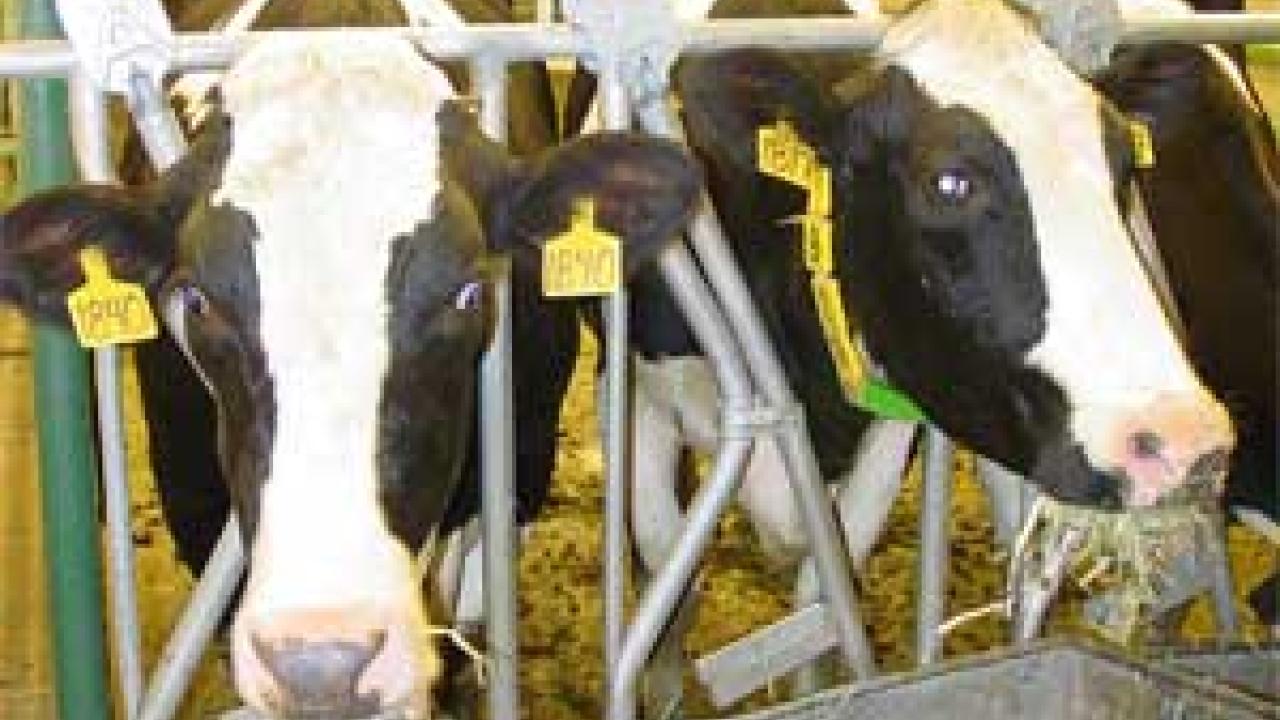California dairy cows produce only half the amount of air pollution as had previously been believed and, perhaps more important, most of a dairy cow's contribution to smog comes not from her manure, but from her belching, says the UC Davis scientist conducting the first controlled study of its kind.
Those unexpected findings may substantially change the thinking and the practices of California regulators and dairy operators trying to reduce air pollution.
"Our discovery means our whole approach to dairy waste management and air-emissions management might change," said Frank Mitloehner, the UC Davis air-quality specialist who is conducting the study. "We have to re-think that the only good solutions are engineering solutions, such as capping or aerating manure lagoons, and consider biological avenues such as animal feeding and management."
"For the first time we can tell dairy farmers the source of their air pollution," Mitloehner added. "For the most tightly regulated pollutant, the 700 ozone-forming gases collectively called volatile organic compounds, that source is not the cows' waste. It's the cows."
For three months, Mitloehner has studied dairy cows in controlled environmental chambers to collect precise measurements of the volatile organic gas emissions they produce. The information is urgently needed by the $4.6 billion, 1.5 million-cow California dairy industry -- the largest in the world -- as dairy producers try to comply with strict new pollution rules.
The dairy-air study is planned to last for two more weeks, but the California Air Resources Board asked Mitloehner and others to present their preliminary findings today at a meeting of the San Joaquin Valley Air Pollution Control District in Fresno.
The study was prompted by concern over air quality in the San Joaquin Valley, which ranks as the worst in the country. The No. 1 source of ozone (smog) air pollution in the valley is exhaust emissions from trucks and cars. The No. 2 source is thought to be gases from cows on dairy farms.
Using state-of-the-art air-collection and analytical technology, and two environmental chambers to house the cows in, Mitloehner precisely measured animal and waste production of volatile organic gases and other pollutants like ammonia and methane. He also videotaped the cows to correlate the timing of emissions with their activities, such as eating, ruminating and excreting.
His preliminary findings indicate that cows and their waste produce about 6.4 pounds of volatile organic compounds (VOCs) per year.
The only previous estimate of total VOCs -- the estimate that California's rigid new air standard is based on -- is derived from a scientific study conducted in 1938. That old estimate says that a cow produces 12.8 pounds of VOCs per year -- twice the amount that Mitloehner found.
Furthermore, Mitloehner found that about 2.5 pounds of the total 6.4 pounds, or only about 40 percent, comes from excreta.
Mitloehner is lead scientist on the $85,000 study, which is funded by the U.S. Environmental Protection Agency and the San Joaquin Valley Air Pollution Control District.
His collaborators are 14 atmospheric scientists, engineers and physicists -- six from UC Davis, three from Stanford University, two from UC Berkeley, and one each from Harvard University, Iowa State University and the U.S. Department of Agriculture.
Mitloehner is an expert on dairies and air pollution. He is a UC Cooperative Extension specialist in the Department of Animal Science in the UC Davis College of Agricultural and Environmental Sciences.
He also is the chair of the UC Davis Agricultural Air Quality Center, which has 24 associated faculty members. UC Davis is a leading center of air-quality research; with 54 faculty members working on the subject, UC Davis has the largest university air-quality research program in the United States.
Media Resources
Frank Mitloehner, Animal Science, (530) 752-3936, fmmitloehner@ucdavis.edu
